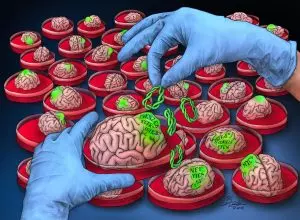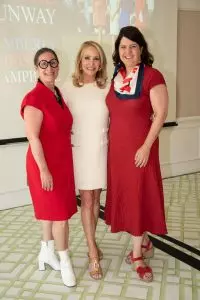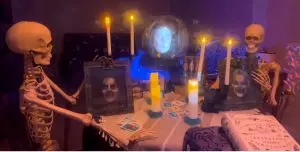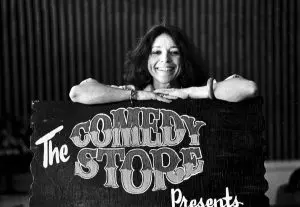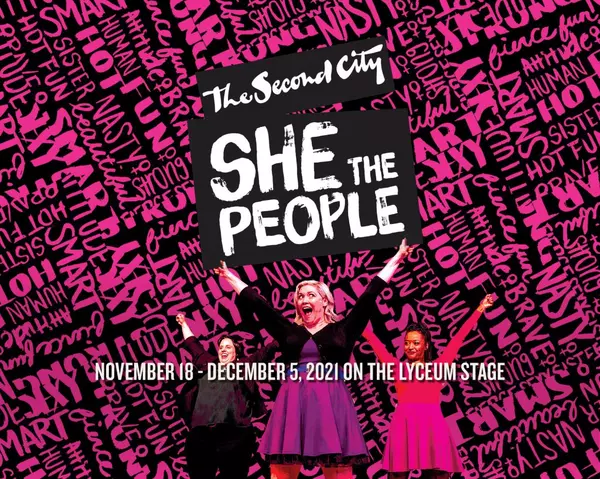
Second City to Grace America’s Finest With ‘She the People’
Renowned Comedy Troupe to Grace ‘The Rep’ StageThe Second City was and is, in this writer’s opinion, the very genesis of comedy and improv. Those of us old enough to remember the original Saturday Night Live and the ‘Not Ready for Prime Time Players’ really appreciate the true cutting edge comedy and improvisation that Second City, originally founded in 1959, has brought to the U.S. It has also proven to be the training ground for some of America’s finest comedy and improv performers. I have so many memories of being at Chicago Second City and laughing until my guts hurt at the amazing comedy and improvisational sketches by talents like Tina Fey, Bill Murray, Stephen Colbert, Steve Carell, the Belushi Brothers (John and Jim), Eugene Levy and so many more phenomenal talents.And now, the improvisation comedy troupe has relaunched the tour of its all-female comedy sketch show, “She the People.” The show, which in the past has featured humorous sketches about dating, feminism, body image, parenting, sexuality, and more, has been updated for its relaunched version (after a Covid-19 interruption, of course) with bits that satirize the reality of being a woman in today’s America. Because of its subject matter, the Rep is advising ticket-buyers that this show is “geared for women and people who love women.” So, because I love women (one in particular), I am definitely planning to attend. The show does state some content may not be of appropriate for children, and from my experiences with Second City material, that would be indeed true, so leave the little ones at home.San Diego Repertory Theatre artistic director Sam Woodhouse said he is excited to see the new show its talented writers and performers have created. “As soon as we heard that the comics from The Second City have created an evening written and performed entirely by women, we signed up for the experience,” Woodhouse said in a statement. “We couldn’t wait to discover what this group of satirical comedy pros have to say about women in our world today.”“Second City: She the People” will run Nov. 18 through Dec. 4, at the ‘Rep’ with performances at 7 p.m. Sundays, Tuesdays and Wednesdays, 8 p.m. Fridays, Saturdays and Sundays and 2 p.m. Saturdays and Sundays. Proof of full vaccination or negative COVID-19 PCR test within 72 hours of show time will be required, so don’t forget. Masks may also be required, so check that out, as well.For tickets, call (619) 544-1000 or sdrep.org.The post Second City to Grace America’s Finest With ‘She the People’ first appeared on SD Entertainer Magazine.

Movie Review: “Eternals”
The most heavily promoted Marvel’s Avengers-like movie has finally graced the theaters. Are the Eternals the next generation of Avengers? Not quite. Although the movie’s trailers make it look like a close-knit family of immortal superheroes, the story goes totally sideways.The Eternals were created 7,000 years ago by the Celestials, who oversee the universe. Ajak (Selma Hayek), the leader of the Eternals, can communicate directly with Arishem, Prime Celestial, the deity who created the first sun and brought light to the universe. Under Ajak’s titulage are Ikaris (Richard Madden, “Cinderella”) and Sersi (Gemma Chan, “Captain Marvel,” “Crazy Rich Asians”) – whose on and off romance spans for centuries, Thena (Angelina Jolie, “Maleficent,” “Salt,” “Wanted“), Druig (Barry Keoghan), Gilgamesh (Don Lee), Kingo (Kumail Nanjiani), Makkari (Lauren Ridloff), Phastos (Bryan Tyree Henry) and Sprite (Lia McHugh). Ikaris is the MCEU’s Superman; he can fly and shoot laser beams out of his eyes. Sersi could transform objects into other matters. Thena is the goddess of war and skilled in weaponry; she can conjure up a golden sword and spear from thin air and fight with balletic grace. Druig is mind-controller. Gilgamesh, with his hulking frame, is super strong. Kingo could form fire balls with his hands. Makkari is the Flash here; she’s a deaf super-speedster. Phastos is a technology inventor. Sprite is an illusionist and has the body of a perpetual teen. Kudos to Marvel for pulling together the most diverse cast (races, genders, ages, orientations, impairments) onto the big screen!The Eternals were sent by Arishem from Olympia to travel to Earth to watch over and protect humans from the monstrous Deviants. They’re first seen in 5,000 B.C. in Mesopotamia. They have lived through centuries of civilizations. While they have marveled by the wonders of this beautiful planet and human progress, frictions have emerged over time, as they have also witnessed wars, destructions and deaths. Per Arishem’s order, these superpowered beings are strictly prohibited to interfere with human affairs in order for mankind to develop as they are meant to be. But after thousands of years have passed, some have begun to question their purpose and why they can’t help, even though they have the otherworldly abilities to make the world a much better place. At the same time, aren’t flaws what make humans truly humans? This central moral conflict, combined with one of the Eternals suffering from a memory overload, which is a mental condition, split the Eternals apart and they go on their separate ways. After all, the Deviants were defeated and they’re just waiting around for Arishem’s order to return home to Olympia. The present day brings the story forward to London, where human-loving Sersi is now a museum curator and in a stable relationship with a human, Dane Whitman (Kit Harrington). She also lives with Sprite as her roommate. After a surprised attack by the Deviants, whom they thought had been exterminated long ago, Ikaris shows up to lend a hand. Not only these modern-day Deviants turn out to be stronger and seem to have self-healing ability, they are also targeting the Eternals this time around, not humans. This prompts Sersi, Sprite and Ikaris to band together and track down the other Eternals.Unexpected would be a major understatement for what awaits the trio. Ajak is in an unimaginable place. Kingo is a flashy Bollywood star, running a century-long, one-man dynasty for eons. He injects a lot of levity into his scenes, which is sorely needed. Phastos has retired from inventing, has a husband and young son. Gilgamesh and Thena isolate, with him taking more of big brother role of a protector and caretaker. Druig has gone off the grid and lives in the Amazon jungles. Makkari resides in what used to be the ancient Mesopotamian region. Along the way, twisted secrets are revealed, which make them question their identities and life’s purpose further. It’s definitely not a straightforward story of noble alien superheroes serving as Earth’s protectors. As someone who loves history, whether real history or historical fiction, I actually wished the backstories were much longer. I wanted them to stay in the past and explore their lives there first. I wanted to know more about these characters, the family-type of relationships, the friendships and the romances. However, this wouldn’t be possible due to the length of the movie, already at a staggering 2 hours and 37 minutes. It would have been neat to have another movie that lays out the foundation and tells the stories that led to this “Eternals” movie. The Avengers had the benefit of having solo movies prior, so you’re invested in the main characters and their journeys. The Eternals does not have this advantage, and as a result, so many expositions are crammed into the movie and the scenes jump from one to another with super quick cuts. While the pictorial shots of real landscapes in natural light and historical places are sweepingly stunning, the scenes feel rushed because of how quick they are. They’re gone in a flash before we could digest them.The story goes far beyond a typical dysfunctional family. It touches on free will and destiny, blind faith and loyalty, duties and betrayals, convictions and morality, purpose and meaning about who they really are and what the right thing to do is. And it’s not simply a familial conflict; it’s a full-blown existential crisis, treacheries and tragedies to the point of no return. What’s unexpected for me was how bleak the movie is. While superhero movies typically have twists, the twists in this movie are shockingly dark, which doesn’t feel like a Marvel movie. It makes the superheroes’ rivalry in “Captain America: Civil War” look like child’s play. Director Chloe Zhao has crafted something different. Unlike the universally praised “Shang-Chi and the Legends of the Ten Rings,” it’s also understandably divisive. The use of natural terrains is a nice touch. The costume designs look celestial. While the movie has the big special effects scenes that come with a superhero movie, it’s not a formulaic Marvel film. While there are certainly typical action scenes, the movie digs deeper into the dynamic of multiple layers of relationships and dark human drama, even if they are not humans. The closing credits show how the Eternals are eternally and subtly weaved into human history through the artifacts. The post-end credits show potentials of what the saga may continue.Copyright (c) 2021. Nathalia AryaniThe post Movie Review: “Eternals” first appeared on SD Entertainer Magazine.
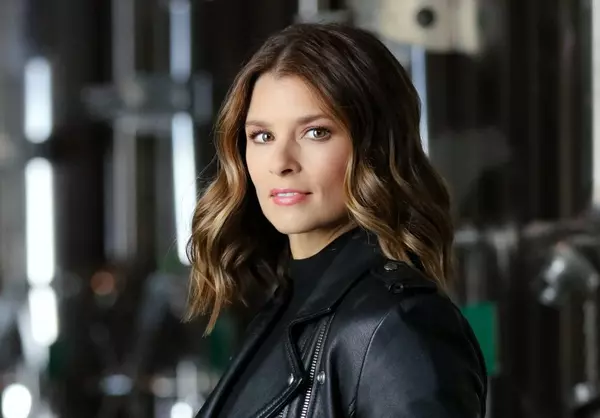
Danica Patrick’s Unfiltered Thoughts on Racing, Sexism, Money, the Bible
As a racecar driver, Danica Patrick broke barriers and set records with her on-track performance.It wasn’t long before she joined the mainstream ranks by succeeding in the male-dominated world of professional motorsports. With stunning good looks and an unrelenting ambition to top her personal best in every race, Danica was named to TIME’s 100 Most Influential People list, while her figure graced the pages of the Sports Illustrated Swimsuit Issue. Making her mark in pop culture, Danica has appeared in a record-setting 14 Super Bowl commercials.In 2005, Danica Patrick stunned the world by leading 19 laps and finishing fourth in her first Indianapolis 500. She became the first woman to lead laps and score a top-five finish in the historic race. In 2008, Danica made history again becoming the first woman to win a major-league open-wheel race in a North American series with her victory in the IndyCar Series Indy Japan 300 race. In 2013, as Danica transitioned to the NASCAR Cup Series, once again making headlines with her record-setting performance in the 55th Daytona 500 race. She became the first woman to win a NASCAR Cup Series pole when she set the fastest time in qualifying 500, and then finished in eighth place, the highest finishing position ever for a woman in the “Great American Race.”In 2018, Danica closed out her time in racing with the “Danica Double” and competed in two marquee events that were cornerstones of her career: the Daytona 500 and the Indianapolis 500. That same year, she became the first female host of the ESPY Awards which on the ABC network. Doing a deep dive with Danica Patrick, it’s clear that rising to the top of a largely male dominated sport was as natural as breathing for her. The girl specializes in shattering glass ceilings. Danica is a woman who stands in her truth and unapologetically uses her voice to express her opinions. In this in-depth interview, she bares her soul with strength and vulnerability as we cover everything from her upbringing and early racing days to relationship realizations and overcoming insecurities (yes, she’s dealt with imposter syndrome, just like the rest of us). Now, retired from racing, Danica is focused on her aptly named podcast, Pretty Intense, her speaking career, and her new role as vigneron and sole proprietor of Somnium Wine, her vineyard in Napa Valley, California, as well as her Provence Danica Rose wine brand. Allison Kugel: You started Go-Kart racing as a kid, with your family. What was the impetus for turning that hobby into professional racing?Danica Patrick: I don’t think there was a specific point where I said, “I’m going to try this.” It was more of a natural progression. I remember when I was ten, I thought I would go to college for engineering to learn how to work on my race car. That was my first thought. The next jump was when I was sixteen and I moved to England to continue pursuing racing. I left high school. It was my junior year, and I pretty much didn’t even go [to high school] that year. I left halfway through my junior year, during Christmas break. I guess at that point in time I thought, “Hey, let’s see where this can go,” because there was a talent and there was an interest. I moved to England when I was sixteen and lived there for three years without my family. Then I came back, and I didn’t have a ride. I wasn’t racing, and at that point in time I think a lot of people, and I think probably a lot of parents would be thinking, “You better get your shit together and go figure out what you’re going to do.”Allison Kugel: Did you have a moment of “Yikes, what have I done? I left school!”?Danica Patrick: Honestly, I didn’t. I always had a lot of what I would call “blind faith,” that it was going to work, and I say blind faith because there is no way it should have (laughs). I’m not from a famous family of racing names. There wasn’t some fallback if I didn’t make it on my own in racing. It was just me. There really was no good reason why I should make it, other than the fact that I just really had a lot of confidence that it was going to work out. I believed that if someone gave me a chance it could really be a big deal, and I could do the job. I stuck with it, and it was when Bobby Rahal hired me to drive his Formula Atlantic car, which was one step under Indy cars, which was probably the next step for me. The next point after that, because you never know how long stuff is going to last, thank God, was four races into my Indy car career. I had a big Indy 500 month. I almost qualified on the pole, and I almost won the race my first time there. It wasn’t one moment; it was a series of moments that got me there. Allison Kugel: Were you aware at that young age, that, for the most part, this was not a woman’s sport? Like, “I’m doing something that women don’t do.” Danica Patrick: No, because that wasn’t the way I was brought up. It wasn’t like I was the only one. Sometimes there was another girl out there. I mean, shoot, at first my sister did it too. It wasn’t a complete anomaly, it was just more rare. My dad taught me to be the fastest driver, period. All through my Go Karting career, it was not about being the fastest. It was not about being the fastest girl. It was always about, “How fast can I go?” And so sometimes that meant I was half a second quicker than anybody else, because just being the fastest wasn’t my best. My best was more. Allison Kugel: You had an awareness that you were not competing against the other drivers, you were competing against your own best performance.Danica Patrick: Yes. I think that was a core value. It’s almost like, there is no ceiling on this. How far can you take it?Allison Kugel: Were there naysayers? Was there any bullying or sexism that you encountered? Danica Patrick: That’s such a common question, especially being a girl in a guy’s sport, but that is not what happened. Allison Kugel: That’s good, that it didn’t happen. Danica Patrick: You know, any amount of it is human. Trust me, living in England and being a teenager with a bunch of teenage guys and having them gossip, or make jokes, or you could tell they’re whispering about you… but it wasn’t about being a girl. That was about being that age, you know? Maybe part of it was about being a girl, but that’s not what I chose to focus on. What I chose to focus on was that I was at a really pivotal age. Teenage years, boys will be boys, and this is just human nature. If this didn’t just happen at the racetrack, it would have been happening in school.Allison Kugel: Good point.Danica Patrick: Look, if someone is pinning me down for something that I’ve done that they don’t agree with, it’s like yeah, okay. But they’re also talking about me when I finish fourth, and you know what, they’re not talking about the guys when they finish fourth. You can’t go off and criticize the bad, because it seems like they’re coming at you because of your gender or something like that, because then there are other things that are happening because of [of your gender] that are great. I’ve always chosen to focus on the good that came with it, and not the bad, and I think it’s given me a really good non-victim mentality. Playing the victim is like an epidemic, and it’s hindering to progress. There is really nothing good that comes from it. Allison Kugel: Do you think the age we are living in now, with cancel culture, is that what you are referring to as the “victim epidemic?” Danica Patrick: I think it’s just a dangerous place to be. I think that anytime you are focusing outside of yourself, is not the right focus.Allison Kugel: During your racing career, did you ever think about the possibility of grave injury, or the possibility of death? Danica Patrick: It is an awareness, but I don’t think it’s something you really think about a lot. I guess sometimes it’s contrast that gives you that perspective, in hindsight. I did the broadcast for the Indy 500 the year after I was finished, in 2019. I’m sitting on this pit row in the pit box with [sportscaster] Mike Tirico. We do a lot of the pre-race coverage, and then it shifts to the booth after that, and we’re done doing the majority of the work. The cars were coming down the front straightaway to take the green flag, and I remember I was having this moment where I was laughing and thinking this is such a different place to be [sitting]. Then I remember also thinking, “They are so crazy.” I knew how dangerous it was. From the vantage point of a spectator, I was able to let it get into my mind more, and into my body, and realize what the consequences were of a bad day, of a crash. Our perception is what creates our reality. If I would have had the perception of how dangerous it was, maybe it would have changed me as a driver, or changed how long I did it, or even if I did it. But I didn’t have that perception. There was an awareness, because I’m human and I’m not blind, but it wasn’t something that I put any huge amount of attention on. Allison Kugel: Has there been any type of fear or phobia that you have had to overcome? Danica Patrick: A million (laugh). There are many things that I’ve had to overcome. I’ve had to overcome the fear of not being good enough. I think that was a programming I got from a young age, from my dad pushing and pushing me. But if I had to choose between a dad that pushed me really hard and got me to where I am or have a dad that let me just do whatever I wanted and was easy going and not hard on me, they both have consequences. I’m happy to get the one that I got, but it doesn’t mean that I didn’t have something to deal with. My dad pushed me a lot and I had this sort of narrative in my head that nothing was ever good enough. If anyone ever criticized me for being lazy or not trying hard enough, I would get defensive. I would get triggered by it, because that was a wound, that feeling that I wasn’t good enough. That could show up in perfectionistic ways in work or in my relationships. It’s something I feel like I’ve had to deal with, and I’ve had to learn how to take compliments and to own the good things I have done, and to acknowledge that they are enough and that I am enough. Allison Kugel: By the way, that is one of the most common things I hear from people I interview. These are all people at the top their respective industries. It’s a common trait among high achievers. Danica Patrick: Thank you for sharing. I think the more it’s talked about, the more we understand. It’s important for people to understand that you get your patterning and programing from your family; from your parents, generally speaking, and that there is work to do later. My biggest accomplishment outside of my racing career, my biggest personal accomplishment, has been accountability and taking ownership for my part in things. It’s knowing that I attract my current reality based on my perceptions, based on my fears, based on my frequency. All of that stuff gives me my reality, and I am the creator. What we resist persists. If you constantly have a fear of not being good enough, you are going to constantly attract people that make you feel not good enough. Allison Kugel: That reaffirm that, yes. Danica Patrick: Exactly. What we are trying to do is correct the original wound, right? We think, “Well, I’ll prove it to this person, that I’m enough.” Allison Kugel: Yes, and that shows up, big time, in our romantic relationships. Danica Patrick: Exactly. We can’t fix it. It’s just a pattern showing itself over and over again to get you to change, do it differently, and see yourself and your part in that pattern. Another one is the mom stuff. This sort of fear of abandonment, which lends itself to co-dependency and being afraid to be alone. Once I was alone, I was like, “Wow, there is a lot of empowerment here.” I realized that the way I would show up would be really not as empowered and not as confident. I think the professional lessons have been more along the lines of effort, and I’m not going to bullshit around, you get out of it what you put into it. Sometimes things happen that are wonderful and they’re natural and they flow. When you are in flow, you’re doing what you should be doing, and things do come to you when you’re doing what you should be doing. Once you know what you want, things just happen, and it flows.Allison Kugel: Whenever somebody says to me, “Well, I really wanted to do this, but I have to make a living,” my response to that is, “I don’t care where you get your paycheck from. If you want to do something and it resonates with your soul, do it. Do it at night, on the weekends, join a club for it. Don’t let anybody take that away from you and don’t shortchange yourself.Danica Patrick: You can turn your passion project or something that you do on the weekends into your whole world. I always feel like the ceiling for things that are your job, but not your passion, at best is like an eight out of ten. There is no ceiling to what happens when you do something you are passionate about. All of the best stuff we have in this world comes from someone’s passion. When you set out solely with the goal of making money, I could almost guarantee you that it’s not going to last forever, or it’s not going to be that successful. Even if it is, it won’t feel good because that’s not what the human experience, your emotions, and your heart wants. Your heart wants something so much more expansive. Money is just energy. It’s just an exchange of energy. You do something great, and you get money. It’s over. That’s transactional. When you set the goal to change people’s lives, to inspire people, to give people hope, to make them smile, there is no end to that.Allison Kugel: Absolutely. It just expands and expands. Let’s talk about your podcast, Pretty Intense.Danica Patrick: The name of the podcast comes from the title of my book, which came out in 2018, as a three-part book. It’s the mind, food, and then it’s fitness and the body. It starts with the mind, because what stops us from finishing anything that we want to accomplish? Our mind. We all know what it takes to eat healthy, we all know what it takes to work out or to lose weight and get fit and strong or build muscles. It’s not rocket science, but it’s our mind that stops us from being consistent and disciplined. So, the mind is where it starts. Then it gets into food and talks about the diet and how I live and eat, along with recipes that I wrote and photographed. The last part is on the body, with a workout program that I wrote that takes you through 12 weeks. I love health and wellness, and anything to do with physical and mental wellness is just my jam. The idea for the podcast, Pretty Intense, really got going in the beginning of 2019. I love to talk to people. I love to ask questions. I learned that I had to learn how to listen better (laughs), because I’d never done interviews, previously. I’d always been the one being interviewed, and my job is to ramble on to give you things to write or to air on TV, but I had to learn how to listen which was a good lesson. My podcast is all about diving in with people, and the most rewarding thing is when I get to the end of the interview, especially if it’s someone who does a lot of interviews, and they say, “You ask questions and got me to talk about things I ‘ve never even talked about before.”Allison Kugel: Isn’t that the coolest feeling?Danica Patrick: Yes, that’s the best. Your thinking, “Wow, all these years and I’m the one that got an interview out of you that you’ve never given before!” You do such a good job too. I love these questions. Allison Kugel: Aww, thank you.Danica Patrick: I’m sure you get that too, and that always feels so good. I believe one of my jobs here is to wake people up and to be a little bit of an initiator and that spark. I want to teach people that we are more alike than we are different. Division is another epidemic right now. We are finding and figuring out every possible way for people to divide. It just seems like it continues to compound, and it’s such a detrimental process to the human experience because community is literally the foundation of wellness. When people are taken out of community, just like in the body, when you take a cell out of its cell community, it goes rogue or kills itself. The same thing happens in the human experience, and we have been put in the worst of positions in the last year and a half to be out of community.Allison Kugel: If you could travel back in time and be able to alter any famous historical event, where would you go and what would you attempt to change, or bear witness to?Danica Patrick: I just want to go back to the time of Jesus and see how that really went down, be there for it, and see what happened. I also have such a deep fascination for Egypt, for Egyptian mythology, and for the ancient times of the pyramids. I would really want to go back to how the pyramids were built, who built them, who used them, and how people were living back then. What was the technology that was used? And to be able to see if there were really giants, was it extraterrestrial, was this anti-levitational or gravitational technology they had back then, that they decided to not use anymore? The building of the pyramids, I would love to see what that was like, what living was like then, and how they did it. And maybe Adam and Eve. Was there really Adam and Eve? Was it just two people and where was the Garden of Eden? Did they just appear? That would be interesting, because I think I’d just be sitting there watching nothing happen. Things in books from that long ago, we get the story wrong. If two people look at exactly the same thing happen, there are two different stories, and now you’re expecting these stories to get passed down in the Bible years after it actually happened. You’re telling me they got it verbatim? You’re telling me they didn’t get poetic with it? You’re telling me there wasn’t interpretation being written? I think there was probably a lot of stuff that didn’t happen exactly like we think it did. Allison Kugel: That’s an interesting one. Do you pray? And if so, who or what do you pray to? Danica Patrick: Yes, I do. How I pray has evolved and been confusing at times, even to the point where that’s become part of my prayer, like, “I’m not sure who to talk to right now,” so I cover them all.Allison Kugel: Laughs.Danica Patrick: I think a big underlying reason why prayer is so powerful is because you’re asking, you’re creating your own intention, you’re allowing yourself to know what you want, because so many people don’t even know what they want. They’re just a passenger in life. I think that having goals is important. There’s that manifestation nature of it. With prayer, there’s that manifestation part of it, especially when you get into the emotional side of it, whether it’s Tony Robbins, Joe Dispenza, Bruce Lipton, or Gregg Braden. Allison Kugel: All brilliant people…Danica Patrick: They will tell you that you have to anchor your future by embodying the true feeling and emotion of what you envision, visualizing what you want, anchoring into that future life that you want, whatever it is, and then embodying that feeling and really letting it become a part of you. Your mind can’t tell the difference between a truth and a lie.Allison Kugel: You’ve been watching the same stuff as me (laugh).Danica Patrick: I can tell you watch this by your questions. I have a bookshelf full of all of this stuff, and by the way, that is my favorite thing to do with my podcast, is interview these kinds of people. I’m so fascinated with Quantum Physics, with science, with manifesting, with spirituality, and wellness.Allison Kugel: It’s the new frontier, right? The previous generation didn’t have access to this information.Danica Patrick: They didn’t, and I think possibly people were repressing this information. I think a lot of things have been repressed over time, because the answer to ninety-nine out of a hundred a question is money. A lot of things have happened because someone was making money from it. Whether it’s wellness, whether it’s Nikola Tesla who had free energy figured out and they decided instead to figure out how to get people to pay for it. Even water. It seems silly when I go to the store and buy a five-dollar bottle of water, if I’m traveling or something, they find ways to monetize everything.Allison Kugel: Let’s talk about your wine company, Somnium Wine. Why have you chosen to purchase a vineyard and invest in your wine brand? Danica Patrick: I bought a piece of dirt, planted it, and made Somnium Wine. It started from nothing and then Danica Rose came about more recently with the opportunity to make an authentic rose. I always felt my brand has been rooted in authenticity, so I felt like this was in alignment, to make a rose from Provence, the birthplace of rose. The purpose of wine is about being present with the people that you are with. The goal is to get people to connect and to create memories together, to tell stories, to open up to one another. I want my wine to facilitate old school gatherings where you talk to each other, spend time together, make a meal and sit down at a table together. Communities are, again, a hallmark of wellness.Hear the extended, unfiltered Danica Patrick interview on Allison Interviews. Allison Kugel is a syndicated entertainment journalist and host of the Allison Interviews podcast. Listen at Apple Podcasts, Spotify and YouTube. Follow on Instagram @theallisonkugel.Learn about Danica Patrick’s Somnium Wine and Danica Rose collections, and tune into Danica’s Pretty Intense podcast at DanicaPatrick.com and Apple Podcasts. Follow on Instagram @DanicaPatrick.The post Danica Patrick’s Unfiltered Thoughts on Racing, Sexism, Money, the Bible first appeared on SD Entertainer Magazine.
Categories
Recent Posts
